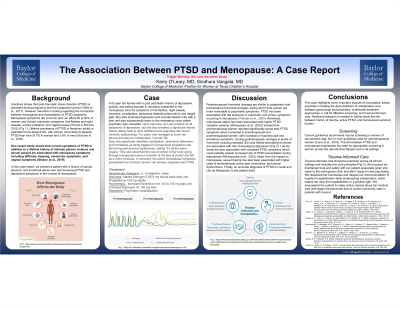Women's Mental Health
(231) The Association Between PTSD and Menopause: A Case Report

- KO
Kerry O'Leary, MD, MPH (she/her/hers)
Psychiatrist
Talkiatry
Houston, Texas - SV
Sindhura Vangala, MD
Clinical assistant professor and reproductive and consultation liaison psychiatrist
Baylor College of Medicine
Houston, Texas
Presenting Author(s)
Co-Author(s)
Background: Literature shows that post-traumatic stress disorder (PTSD) exacerbation is prevalent during the perinatal period1, but there are limited studies describing the relationship between menopause and PTSD. In this case report, the authors describe a patient with a history of sexual, physical, and emotional abuse whose menopausal symptoms contributed to a resurgence of suppressed trauma symptoms.
Case: A 52-year-old female with a past psychiatric history of depression and anxiety presented to the menopause clinic for symptoms of hot flashes, night sweats, sleep disturbances, constipation, abdominal distention and discomfort, and weight gain. During the visit, she endorsed active suicidal ideation, so the psychiatry team was consulted with the question of “depression secondary to menopause”. Though she endorsed all symptoms of depression, a significant sexual abuse history was gradually uncovered, dating back to early childhood and extending into more recent romantic relationships. For years, she managed to cover her trauma and lead an independent life. Eventually, her untreated menopause symptoms, mainly hot flashes and constipation, triggered memories of familiar body and genital organ sensations she felt during the traumatic events. Her primary diagnosis was modified to PTSD. Management included symptomatic treatment, hormone replacement therapy with estrogen and progesterone, modification of psychotropic medication regimen, and psychiatric hospitalization.
Discussion: Perimenopausal hormone changes are similar to postpartum and premenstrual hormonal changes. Estrogen is considered neuroprotective and pro-serotonergic, so the decrease in estrogen during menopause increases the sensitivity of women to psychosocial stressors and potential mood disorders. The physical changes to one’s body during menopause can be triggering for some women. One study shows that current symptoms of PTSD in addition to a lifetime history of intimate partner violence (IPV) and sexual assault are associated with menopause symptoms including difficulty sleeping, vasomotor symptoms, and vaginal symptoms2. Sexual trauma alone has also been associated with higher rates of endometriosis, pelvic pain syndromes, and sexual dysfunctions. This patient's childhood sexual trauma, emotional IPV, hormonal sensitivities, past depression, and active PTSD symptoms all resulted in a more mentally and physically difficult menopausal transition.
Conclusions: This case shows the importance of screening for history of trauma and active PTSD symptoms in perimenopausal women. Additional research is needed to further understand the relationship between trauma and the severity or perception of menopause symptoms. Principles of trauma informed care are imperative in the inpatient consultation setting to create a safe space for patients to speak about symptoms and should be taught to all treatment team members. A whole health approach to treatment is also important and involves addressing symptoms from both a psychiatric and gynecologic perspective, with equal importance.
References
1. Yildiz PD, Ayers S, Phillips L: The prevalence of posttraumatic stress disorder in pregnancy and after birth: A systematic review and meta-analysis. J Affect Disord 2017; 208:634-645.
2. Gibson CJ, Huang AJ, McCaw B, Subak LL, Thom DH, Van Den Eeden SK: Associations of Intimate Partner Violence, Sexual Assault, and Posttraumatic Stress Disorder With Menopause Symptoms Among Midlife and Older Women. JAMA Intern Med 2019; 179(1):80-87.
Presentation Eligibility: Not previously published or presented.
Diversity, Equity, and Inclusion: This case report discusses the importance of women's mental health, particularly recognizing the connection between trauma and menopause. Reproductive psychiatry is an emerging field that deserves further recognition and attention in order to provide optimal psychiatric care to women throughout their reproductive years. It is important for psychiatrists and gynecologists to work together to continue to help destigmatize mental health and advocate for women.

